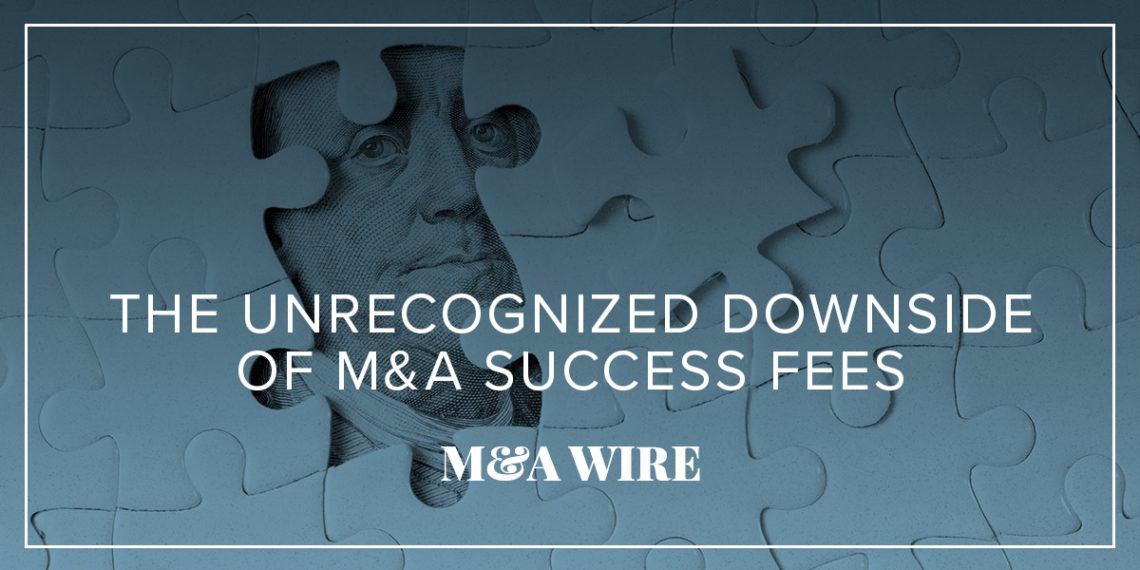Unfortunately, one downside of M&A advisory success fees is that while it ensures that the transaction advisor gets paid “fairly,” the acquirer does not necessarily benefit proportionately. The matter not taken into consideration is that acquirers often struggle to capture a return on investment from acquisition transactions above a hurdle rate. Numerous studies have analyzed these statistics. Data shows that 70-80% of the time, the strategic acquirer does not create significant, positive ROI after the deal has closed. Instead, measured ROI hovers well below a hurdle rate, often close to the transaction’s Weighted Average Cost of Capital. That means that the ROI for the transaction is equal to the costs of financing the deal, meaning no incremental value is created.
Due to the labor intensiveness of the industry, most investment banks structure their fees to include a large upfront retainer fee, often with progress fees as certain transactional milestones are met. Although not insignificant, they are generally a small fraction of the transaction success fee that the investment banker will ultimately receive at the closing table. For larger acquisitions, that success fee is often 2-3% of the deal’s value, sometimes with minimums of $1MM.
Such a high fee creates an expectation in the minds of the acquirer that the investment banker’s service coverage must be comprehensive. Clients tend to assume that the investment bank will successfully help them walk across the “M&A bridge” and step onto dry land.
Too often that is not the case. Sadly, most investment bankers are not trained to thoroughly advise clients in all the eleven areas of due diligence*, nor are they experts in integration planning or execution. Typically, their goal is to get the transaction to the close, collect their success fee, and not linger afterwards.
There is an alternate approach that we think should be considered. If the acquirer is able to redistribute the large success fees directed to their investment banker back into other critical roles on an external team, like due diligence and integration support, we at Watermark Advisors believe many fumbles could be avoided.
In addition to having more funds available (from redirected success fees) for processes deserving more attention, companies would benefit from more integration expertise to draw upon during the period post-close. Such expertise would increase one’s chances of achieving target ROI and strategic success.
In recognition of the likely resistance to reshaping deeply-rooted industry practices (“we’ve always done it this way”), Watermark Advisors has decided to provide a safer path, with no success fees, that is intended to eliminate the fumbles which commonly occur before, during, and after M&A events. Our proprietary processes ensure that buyers feel confident that they have achieved a strategic and tactical success when viewed from both the near-term and long-term perspective. If you are approaching an M&A event, then consider our M&A bridge instead of narrowly focusing on the M&A transaction only. So, on top of no success fees, our approach is more comprehensive, spanning the entire process of M&A from start to finish, including: a preparation phase, a transaction phase, and an integration phase. A company does not step off the bridge until it has measured the strategic and financial success of the M&A transaction.
External assistance is critical as too many acquirers do not master all of the processes, rules, and pitfalls of M&A required to walk across the bridge successfully. Instead they often experience many costly or game losing fumbles.
The transaction phase does warrant, and receives, a great deal of attention. It is common to perceive the closing of the transaction as the major milestone. Most internal and external teams concentrate on the transaction phase with seven processes that need to occur simultaneously: 1) due diligence, 2) valuation, 3) synergies analysis, 4) financing the transaction, 5) deal design, 6) negotiations and, 7) integration planning.
An investment banking team generally handles five of these seven processes. However, the two that the investment banker does not handle (due diligence and integration planning) both influence ROI significantly. Poor due diligence efforts often result in trouble for the acquirer after the close. Equally as significant are the integration planning steps taken during the transaction phase. These steps lay out how the buyer will integrate the people, processes, and strategies of the target.
A leading-edge problem arises when an infrequent acquirer makes the initial decisions about their external team. Often, their board or legal counsel directs them to interview several investment banking firms to assist with the M&A transaction. It is vital that a company chooses the right firm to assist them to derive ROI from their M&A efforts.
With Watermark’s M&A Bridge approach, Watermark not only provides “Core M&A” services, such as valuation and synergy analysis, but it also acts in the capacity of “general contractor.” Based on the client’s approval of other M&A subject matter experts in areas such as due diligence and integration, Watermark will encourage and enforce collaboration among the different “subcontractors” serving on your external M&A team. After all, discoveries in due diligence influence work being done in valuation/synergy analysis, deal structuring, negotiations and integration. The “general contractor” role that Watermark holds is an essential part of what makes the M&A bridge approach drive to better financial and strategic outcomes for the client.
The questions an acquirer must answer are, “How confident are you that your M&A deals will create significant, positive ROI, at or above your hurdle rate? Are you confident you will be one of the 20-30% of all acquirers that hits that mark?” If so, then the traditional approach of hiring an investment banking firm to help you cross one-third of the M&A bridge to reach a closed transaction should be fine. If you are not quite as confident, then we believe a comprehensive, collaborative approach is a better decision.
*1. financial, 2. tax, 3. commercial, 4. legal, 5. HR processes, 6. HR culture & leadership, 7. IT, 8. operational, 9. environmental 10. intellectual property (IP) and 11. reputational.

